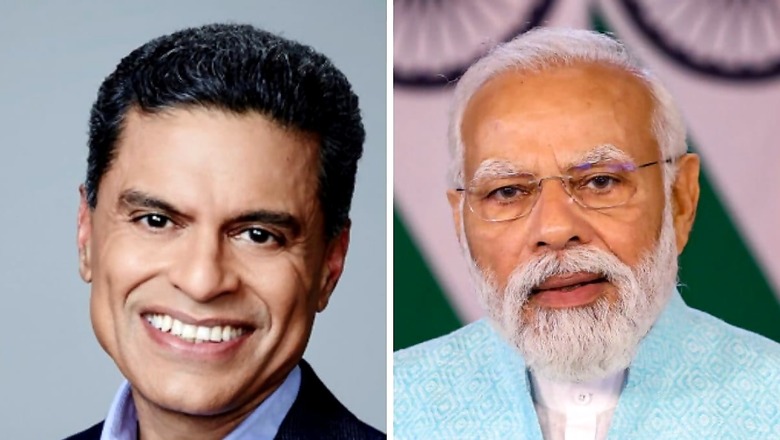Lecturing PM Narendra Modi on Human Rights Will Backfire: Journalist Fareed Zakaria on India-US Ties

views
Amid the buzz over Prime Minister Narendra Modi’s recent United States visit and former US president Barack Obama’s comments, Fareed Zakaria, Indian-American journalist, political commentator and author, on his show GPS on CNN, said that “lecturing PM Modi on human rights is not the best way for the Biden administration to deal with him” and will backfire.
During his visit from June 21-24, PM Modi held bilateral talks with President Joe Biden and addressed a joint session of the US Congress. He led a historic event at the UN Headquarters to commemorate the 9th International Day of Yoga, joined Biden and First Lady Jill Biden for the state banquet, met Tesla owner Elon Musk among other thought leaders and also addressed the joint session of the US Congress.
Obama during a recent media interview questioned the protection of the rights of ethnic minorities in India. He added that if rights of minorities in India are not protected, there is a strong possibility of the country “at some point starts pulling apart”.
ON MINORITIES, INDIA’s DEMOCRACY
Commenting on the criticism, Zakaria said, “…Modi is extremely popular in India and, what’s more, his Hindu nationalism is also popular. Like Recep Tayyip Erdogan in Turkey, Benjamin Netanyahu in Israel and Viktor Orban in Hungary, Modi has tapped into an illiberal vein in India that scorns minorities, checks and balances, and liberal constitutionalism. In all these places, the nationalist-populist leader sets himself and his many followers against the old, secular, cosmopolitan elite that has ruled the country for decades.”
Lecturing PM Modi on human rights would backfire. Far better to ally with India’s society itself, expanding ties with its businesses, press, NGOs, cultural groups and others.My take: pic.twitter.com/Selj1lcYS3
— Fareed Zakaria (@FareedZakaria) June 25, 2023
“In any event, lecturing Modi on human rights is not the best way for the Biden administration to deal with him. That would backfire — not only with him but also with most Indians who would resent Western bullying. Far better to ally with India’s society itself, expanding ties with its businesses, press, nongovernmental organizations, cultural groups and others. India is one of the most pro-American countries in the world, something that is palpable when you are there. Companies, students, scholars, activists — all want closer ties with the United States. This people-to-people alliance will inevitably strengthen the government-to-government relations. But more importantly, I believe that an India that is more deeply connected to the United States will be a country that will naturally seek to perfect its democracy at home. It will also give it moral authority in a fracturing world that could use more of it,” he concluded.
THE CHINA FACTOR
Commenting on the experts’ stance that India can never be America’s ally — oft-cited example is India’s refusal to condemn the Russian invasion of Ukraine — as it is intensely focused on its own national interests, Zakaria said that like any country, India has its own interests to worry about.
“India is changing. In the past, the country has placed little emphasis on foreign policy, devoting its energies instead to managing the vast complexities of its own society, which is characterized by thousands of castes and communities, dozens of major languages and huge regional diversity,” said Zakaria.
“Now, the rise of China has finally gotten India’s attention. The 2020 clash in the Himalayas — when Chinese and Indian soldiers fought bitterly over a disputed border area — was a wake-up call for India’s strategic elite and, to some extent, the entire country. Public sentiment shifted sharply, and today a large number of Indians regard China with hostility. For its part, Beijing has done little to try to solve the problem. It has actually reinforced its military infrastructure along the border, which would allow it to surge troops whenever it sees the need. Since the clash three years ago, India has constrained or outright banned many Chinese companies and technologies from operating in its market, including Huawei and TikTok. The threat from China will motivate India to strengthen its ties with the United States for decades to come,” he said.
According to Zakaria, as India emerges as a great power, it will have to adopt a more expansive vision of its interests around the world. It will need to define its attitude toward the international system itself, and how its own ideas and ideals should affect its stance. In the process, it might well decide that it values a rules-based international system, and see that, as the world’s largest democracy, it gains enormous soft power by adopting a foreign policy that is influenced by its democratic ideals, even if it won’t be feasible in every case to apply them. Such selectivity is, after all, true of most democratic countries, including the United States.




















Comments
0 comment